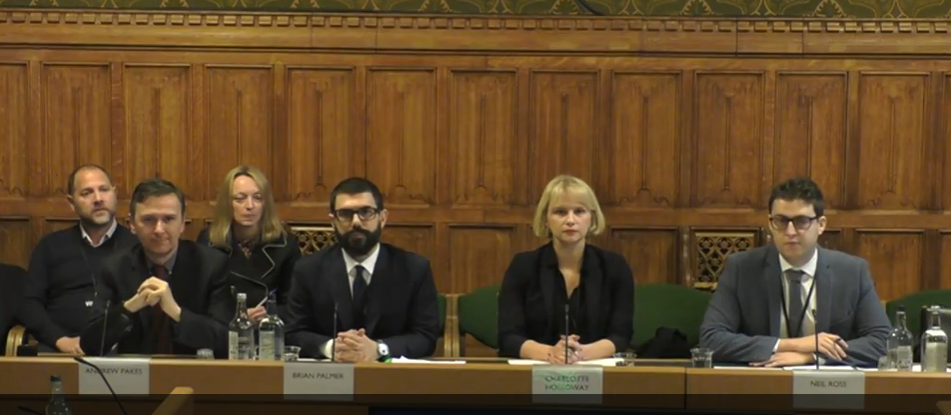Post-pandemic economic growth for UK labour markets: Skills, AI, and modern working practices
The Business, Energy and Industrial Strategy Committee has been examining how artificial intelligence and technology is changing the workplace and what this means for the UK workforce. This includes understanding whether the UK has enough workers with the right skills in the right places to do the jobs required in the UK economy, including issues related to our ageing population, migration changes and the impact of technology.
techUK has provided written evidence and Neil Ross, Associate Director of Policy gave oral evidence to the inquiry.

The impact of Brexit and the pandemic has been felt across the UK economy, which is now grappling with the additional impacts of rising inflation and war in Ukraine. Stimulating economic growth and taking action to ensure the UK economy can recover from these impacts will be critical.
However, even before the pandemic and the increased pace of digital adoption that came with it, UK businesses were not able to recruit the skills they need to grow and prosper. In particular, the UK is lacking the digital and technology skills that are becoming increasingly essential across all sectors of the economy. techUK has seen the demand for digital and technology skills outpace supply for some time and the sector remains keen to hire new, skilled talent. Jobs in the tech sector pay 50% more than the average for all vacancies in the UK, and equipping people with digital skills will be key to driving higher wages and wider economic growth.
Trends towards more flexible working models and remote work were also accelerated by the pandemic, revealing benefits for productivity and wider inclusion in the UK labour force. However, concerted action is required by government to respond to these trends and their implications, as well provide the clarity and guidance businesses and individuals need to take advantage of these new ways of working.
techUK made a number of policy recommendations across skills, AI, workers’ rights and protections, and employment status and modern working practices:
Skills:
- Calling for the Shortage Occupation List to be sustainably reformed and encouraging UK Visas and Immigration (UKVI) and the Home Office to work with the Department for Education’s Future Skills Unit on how labour market data can be better effectively shared and used across government departments.
- Calling on government to expand the Help to Grow: Digital scheme and introduce a Digital Skills and Productivity Tax Credit to incentivise companies, particularly larger SMEs (100 + staff), to invest in training their workforce as well as to adopt productivity-enhancing technologies in their business models.
- Recommending that government review and reform the Apprenticeship Levy, increasing the lifetime of apprenticeship levy funds from two to five years and increasing the transferable funds rate from 25% to 80%.
- Calling on government and industry to work together to provide fuller guidance on pathways into a digital job.
- Recommending that government and industry work to expand short modular digital skills courses that focus on job readiness.
- Calling for government to replicate AI Masters conversion courses to other digital sectors.
- Recommending that government develop an online ‘Digital Skills Toolkit 2.0’ to help people navigate to digital skills and careers.
Artificial Intelligence:
- Calling on government to address barriers to AI adoption, particularly in large sectors of the economy where uptake is low, including those around the cost of investment in skills and technical infrastructure.
- Calling on government to support investment in digital skills to support workers as the adoption of digital technologies in the workplace, including AI, continues to grow.
Workers’ protections, employment status and modern working practices:
- Recommending that government seek to address uncertainty in the gig economy around employment status by publishing non-statutory guidance on how employment status definitions work in practice and an improved online tool to help individuals and businesses understand their rights and obligations.
- Calling on government to create a Single Enforcement Body tasked with ensuring consistent and clear obligations for gig economy firms to deliver a fair and competitive market that protects flexibility for individuals and businesses whilst providing protections for all gig economy workers and enabling platforms to offer protections in a way which reflects the way those in the gig economy work in practice.
- Recommending that government review its metrics around pay and hours worked and ensure it has a sustainable way of evaluating good wages and work to drive industry standards in the gig economy.
- Recommending that government take action to embrace flexible working, including making the right to request flexible work available to all employees on day 1, adopting flexible working practices across the public sector, and providing guidance to drive flexible work across the economy.
- Calling on government to consider how initiatives such as funding local co-working hubs can facilitate flexible and hybrid work whilst encouraging high street footfall and supporting the growth of local economies as more people conduct their work locally.



